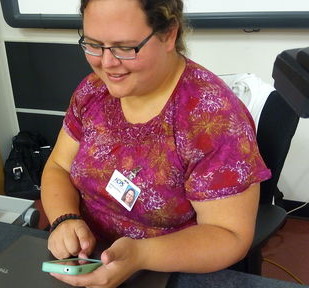My favorite app is… Quick Elements: Jessica Dillon

Jessica Dillon using the app Quick Elements.
October 9, 2015
This is the second in a Lancer Media series exploring technology in the classroom. Read the first story in the series that’s about Ms. Scuffins favorite app, Google Classroom.
Do you know the chemical properties of Uranium? Probably not. Science teacher Jessica Dillon recommends the app Quick Elements that gives anyone the knowledge to answer this question easily.
Quick Elements is a free app available on both Apple and Android market that is aimed to help anyone interested in learning about the Periodic Table of Elements.
“It talks about the way that electrons are inscribed in an atom, an element’s melting point, boiling point, number of protons, electrons, neutrons, basically everything that you could ever want to know about elements is included in this app,” said Dillon.
To use this app, simply tap on an element symbol in the table and the app will flash to a screen with a multitude of information regarding the desired element.
What sets Quick Elements apart from other Periodic Table apps is its ability to be used offline. Most apps require internet or wireless access to run but Quick Elements does not need either. Because this app can run offline, it stores all of its information within the program instead of storing links to information online.
Veteran technology users may shy away from this app in fear that it will occupy too much storage space because of how much information it has. However, at 2.97 MB, the size of this app is very small compared to Skype, which takes up 33.29 MB of storage on an Android phone.
Dillon said, “The application hardly ever crashes or freezes unexpectedly because the app requires very little power to run.”
This app is useful because of its offline feature but it does have drawbacks pertaining to the app’s appearance. It is clear that the developers were more concerned about the functionality of the app rather than the app’s design. For example, the glowing white border around the periodic table is a bit distracting and looks like a throwback to the tacky programming style of 2005.
Regardless, Quick Elements is an extraordinary app that deserves more recognition. Dillon is in support of more educational apps, such as Quick Elements, being used in the Science classroom.
“I don’t think that everything should should come from a book because information is updated all the time, especially in Science class. The data in books isn’t always current since it takes around 5 years to get a new book. By using apps in class, students can access the most up to date information, “ said Dillon.


